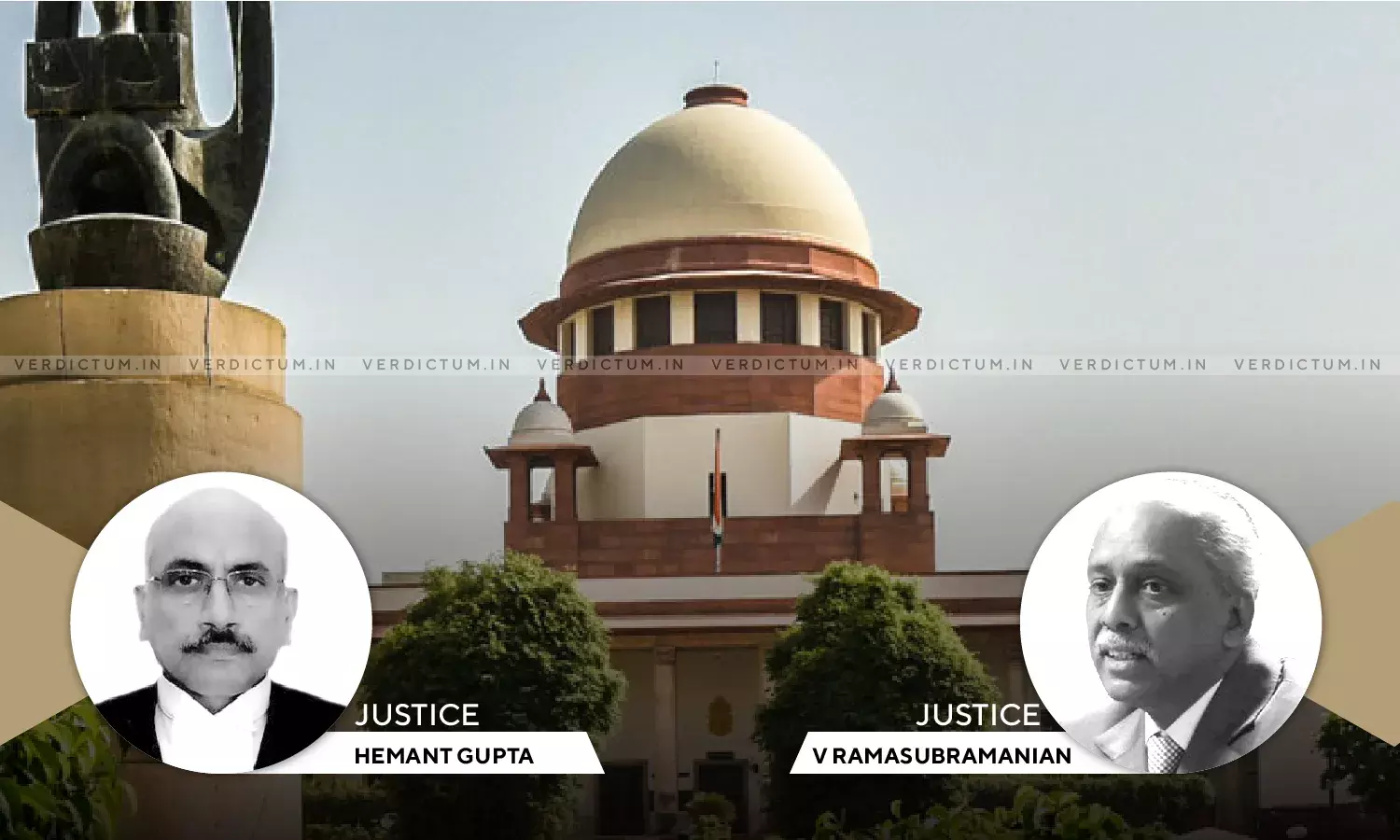High Court Failed To Take Note Of Doctrine Of Necessity - SC Upholds Removal Of Principal Of Institute Of Pharmacy

A two-judge Bench of Justice Hemant Gupta and Justice V. Ramasubramanian has held that once it is admitted, (i) that the disciplinary proceedings commenced with an Inquiry Committee of which the President was a member; and (ii) that subsequently he was replaced by someone due to ill health, the doctrine of necessity would come into play.
The Court also held that the High Court failed to take note of the doctrine of necessity.
In this case, Respondent no. 1 was removed from the post of Principal of the Institute of Pharmacy. This was set aside by the School Tribunal. The same was confirmed by the Single Judge as also by the Division Bench. The Educational Society filed the appeal.
Disciplinary proceedings were initiated against R-1 in 2004 on allegations of certain nature. The Committee held an inquiry in which a fair hearing was accorded. The Committee submitted a report holding that 7 out of 10 charges were proved and hence a show cause was served. The penalty of removal from service was imposed.
This was challenged under Section 9 of the Maharashtra Employees of Private Schools (Conditions of Service) Regulation Act, 1977 before the Tribunal. The penalty was set aside and this was not interfered with by the High Court.
The Apex Court noted that the dispute revolves around the constitution of the Departmental Inquiry Committee under Rule 36 of MEPS Rules.
The Court noted that "In the case on hand, there is and there can be no dispute about the fact that the first respondent was the Head within the meaning of the expression in terms of Section 2(9) of the Act, as he was the Principal of the Institute. But admittedly the first respondent was not the Secretary, Trustee or Correspondent of the Institute, to fall within the definition of the expression "Chief Executive Officer" under Rule 2(1)(c) of the Rules."
The Court noted that the Committee originally constituted had the President of the Society as a member. The case of management is that a letter was issued wherein the President requested the Society to relieve him due to ill health. Therefore, the VP was requested to be a part of the Committee. He was recused due to family problems and hence another VP was nominated. The said VP also opted out. Therefore, a resolution was passed conferring the powers of President to one Shri Amarsingh Shivaji Rao Pandit.
The Tribunal had held that the aforesaid Resolution only surfaced after the conclusion of arguments in appeal and was an afterthought.
The Court noted that the Tribunal omitted to take note of the pleading of R-1 that he had admitted that the chargesheet was signed by Shri Pandit, president of the Society.
Hence, the Court held that the order passed by the Tribunal was vitiated by perversity.
On the subject rules, the Court made the following crucial observations:
"In any case, Rule 36(2)(a) begins with the words "in the case of an employee". Rule 36(2)(b) begins with the words "in the case of the Head referred to in subrule (1)".
The interpretation given by the School Tribunal and the High Court to the aforesaid Rule would have been acceptable, if Rule 36(2)(b) had began only with the words "in the case of the Head". But it begins with the words "in the case of the Head referred to in subrule (1)".
Subrule (1) refers to the Head who is also the Chief Executive Officer. Therefore, clause (b) of subrule (2) of Rule 36 should be construed to apply only to a person who is the "Head" and who is also the "Chief Executive Officer". Otherwise the words "referred in subrule (1)" appearing in clause (b) would become redundant."
The Division Bench had relied upon the judgment rendered by Full Bench of the High Court in National Education Society, Nagpur and another vs. Mahendra, s/o Baburao Jamkar and another, 2007(3) Mh.L.J 707 to come to the conclusion that irrespective of whether the Head of the Institute is also the Chief Executive Officer or not, Rule 36(2)(b) mandates the President to be a member of the Inquiry Committee.
The Apex Court made the following crucial observations:
"As could be seen from the portion of the Judgment extracted above, the full Bench was unduly carried away by the fact that the Head of an Institution will become equated to an employee, if it was held that the President of the Society need not be a member of the Inquiry Committee. But what the Full Bench omitted to take note of was that the Chief Executive Officer of a Society, such as the President, Secretary or Treasurer cannot be an employee of the Institution run by the Society and that a Chief Executive Officer such as the President or Secretary is liable to get elected and not entitled to remuneration. On the other hand, the Head of the Institution is essentially an employee who is entitled to remuneration, seniority, promotion, continuance in service till the age of superannuation etc., and who is subject to the disciplinary control of the Management. In fact the President or Secretary of the Society cannot be removed under the MEPS Rules. But the Head of the Institution can be removed only in terms of the Rules. Therefore, the interpretation given by the Full Bench of the High Court of Bombay in National Education Society (supra), under Rule 36(2)(b) may not be correct."
The Court held that the High Court failed to take note of the doctrine of necessity. Hence, the Court reversed the orders of the High Court and the Tribunal. The Court upheld the penalty of removal from service. The Court noted that if via an interim order any monetary benefit has been granted to the R-1, the same will not be recovered from him.
Accordingly, the appeal was allowed.
Click here to read/download the Judgment

